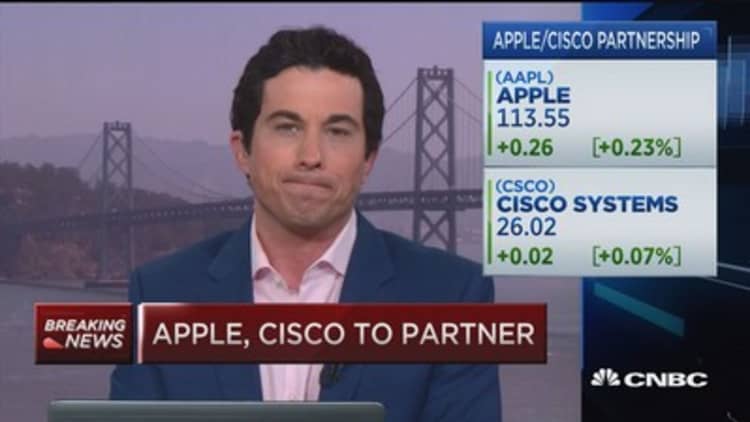The biggest consumer technology companies are taking over the enterprise realm.
Just as Amazon.com's cloud-computing business is reeling in ever larger businesses onto its servers, Apple is formalizing its place in corporate data centers.
On Monday, Apple announced a partnership with networking giant Cisco to tightly integrate iPhones and iPads into the fabric of the workplace. A year ago, IBM said it was starting to build apps for Apple gadgets, along with enterprise heavy tools like device management and security.
Read MoreBest of Apple, Best of IBM
We've been hearing for years about the consumerization of the enterprise, referring to the way business technology is adapting the simpler interfaces and social functions that consumers use while at home and on the move. The most valuable enterprise technology companies, saddled with legacy products and struggling to find growth, are recognizing they need help from Apple, which clearly knows how to make products that people love.
The dynamic is changing the enterprise IT market, which Gartner estimates will be $3.5 trillion in spending this year.
"Companies like Apple, Amazon and Google bring ease-of-use enterprise deployments," said Amit Daryanani, an analyst at RBC Capital Markets. "IBM and Cisco don't care what consumers use. They just want to provide the backbone."
Daryanani has a "buy" rating on Apple and a "hold" on IBM.

To see who's driving change in tech, look atop the market cap charts. Apple, Google, Microsoft, Facebook and Amazon lead the way. All five have massive consumer franchises, and Facebook is the only one among the group that doesn't sell to businesses.
Revenue at Amazon Web Services surged 65 percent in the first half of this year to $3.4 billion. Apple's growth in the enterprise is evident by the 64 percent market share captured by iOS, according to data from Good Technology. Google enters the business world through its Android phones, Chromebooks and cloud-based apps. And Microsoft, of course, has been a major enterprise player for decades.
Meanwhile, among the traditional enterprise companies, Oracle, IBM and Hewlett-Packard all reported declining sales in the latest quarter, while Cisco and EMC grew less than 4 percent.
Read MoreWhat bubble? Legacy tech gets shut out
What Apple and Cisco are actually building together is still a bit vague. The companies said they'll be integrating iOS devices into Cisco's network, and customizing collaboration and video conferencing tools like Cisco WebEx and Telepresence for Apple devices.
"Together with Cisco, we believe we can give businesses the tools to maximize the potential of iOS and help employees become even more productive using the devices they already love," Apple CEO Tim Cook said in the statement.
Considering Apple's tremendous run in the consumer world and its ongoing effort to win with watches, televisions and in the car while also growing in China, investors could question the company's strategy of taking on the enterprise and potentially losing focus. That's especially true given that corporations are buying Apple devices in droves even without formal partnerships.
Read MoreNew Apple TV and iPhone coming soon
Daryanani isn't concerned.
"Apple is big enough that the company can go after both channels," he said.



